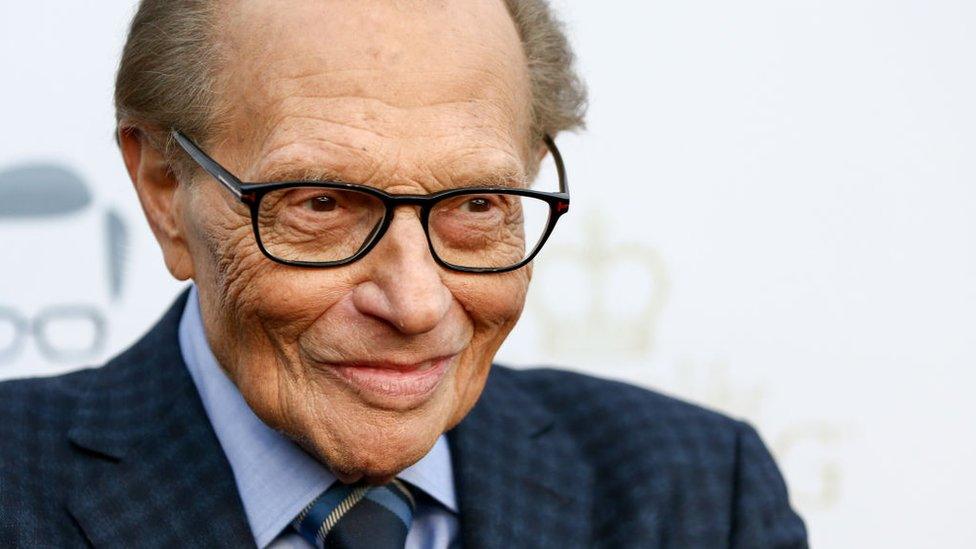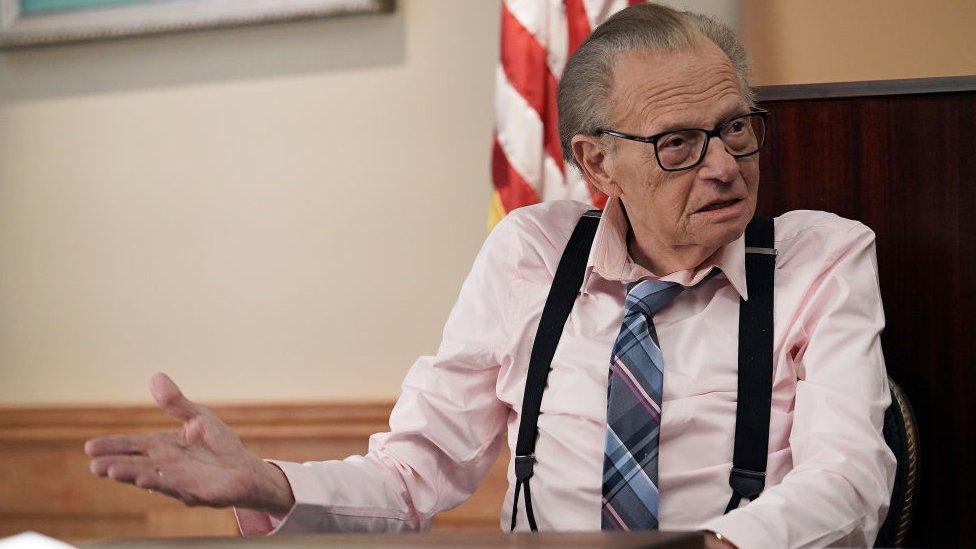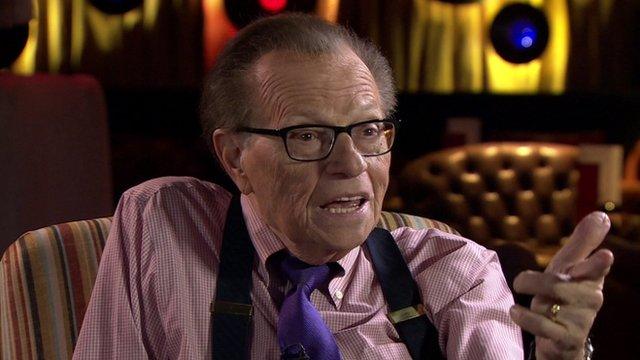Larry King: Veteran US talk show host dies aged 87
- Published

Larry King achieved worldwide fame with his popular CNN talk show
Larry King, giant of US broadcasting who achieved worldwide fame for interviewing political leaders and celebrities, has died at the age of 87.
King conducted an estimated 50,000 interviews in his six-decade career, which included 25 years as host of the popular CNN talk show Larry King Live.
He died at Cedars-Sinai Medical Center in Los Angeles, according to Ora Media, a production company he co-founded.
Earlier this month, he was treated in hospital for Covid-19, US media say.
The talk show host, famous for his braces and rolled-up sleeves, had faced several health problems in recent years, including heart attacks.
King was married eight times to seven women and had five children. Two of them died last year within weeks of each other - daughter Chaia died from lung cancer and son Andy of a heart attack.
'Unique and lasting talent'
King carried out interviews with every sitting US president from Gerald Ford to Barack Obama and a number of world leaders. His other high-profile guests included Dr Martin Luther King, the Dalai Lama, Nelson Mandela and Lady Gaga.
"For 63 years and across the platforms of radio, television and digital media, Larry's many thousands of interviews, awards, and global acclaim stand as a testament to his unique and lasting talent as a broadcaster," Ora Media said in a statement, without giving the cause of death.
Larry King: "I like spontaneity. That's the kind of broadcaster I am".
Born Lawrence Harvey Zeiger in Brooklyn, New York, in 1933, King rose to fame in the 1970s with his radio programme The Larry King Show, on the commercial network Mutual Broadcasting System.
In 1985 he launched Larry King Live on the fledgling CNN, and became one of the network's biggest stars. The programme, broadcast around the world, was a success with audiences, with King answering thousands of phone calls from viewers.
He earned a number of honours, including two Peabody awards, but was also criticised for his non-confrontational approach and open-ended questions. King boasted of not doing much research for the interviews so, he said, he could learn along with viewers.
By 2010 his ratings had dropped significantly, with critics saying King's approach felt outdated in an era of more aggressive interviewing styles. King then announced his retirement, saying: "It's time to hang up my nightly suspenders."
In his final programme on CNN, he told his viewers: "I don't know what to say, except to you, my audience, thank you. Instead of goodbye, how about so long?"
Allow X content?
This article contains content provided by X. We ask for your permission before anything is loaded, as they may be using cookies and other technologies. You may want to read X’s cookie policy, external and privacy policy, external before accepting. To view this content choose ‘accept and continue’.

CNN replaced him with British journalist and broadcaster Piers Morgan, whose programme King criticised for being "too much about him".
Morgan, whose programme was cancelled three years later, said on Twitter on Saturday:, external "Larry King was a hero of mine until we fell out after I replaced him at CNN & he said my show was 'like watching your mother-in-law go over a cliff in your new Bentley.' (He married 8 times so a mother-in-law expert)."
But, Morgan added, King "was a brilliant broadcaster & masterful TV interviewer."
In a statement, CNN president Jeff Zucker said: "The scrappy young man from Brooklyn had a history-making career spanning radio and television. His curiosity about the world propelled his award-winning career in broadcasting, but it was his generosity of spirit that drew the world to him."
Most recently, King hosted another programme, Larry King Now, broadcast on Hulu and RT, Russia's state-controlled international broadcaster.
A Kremlin spokesman was quoted as saying by state RIA Novosti news agency: "King repeatedly interviewed Putin. The president has always appreciated his great professionalism and unquestioned journalistic authority."
Outside broadcasting, King founded the Larry King Cardiac Foundation in 1988, a charity which helps to fund heart treatment for those with limited financial means or no medical insurance.
Related topics
- Published23 January 2021

- Published4 November 2015
